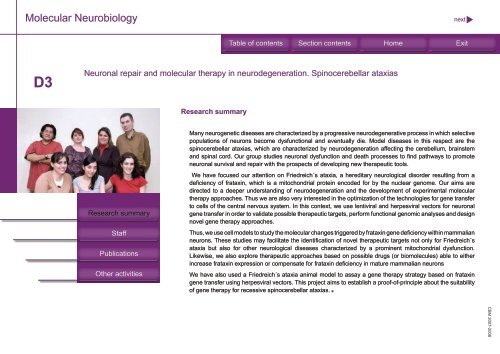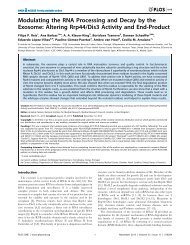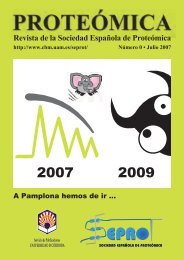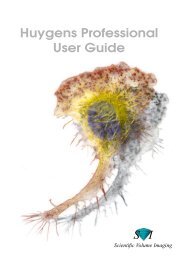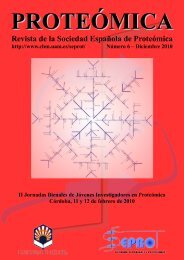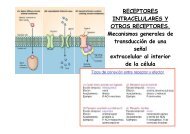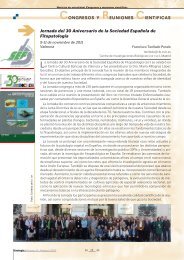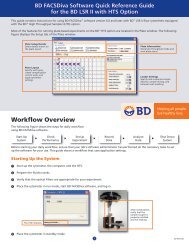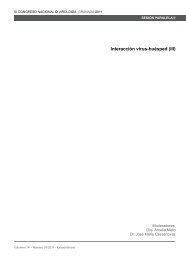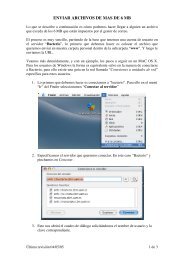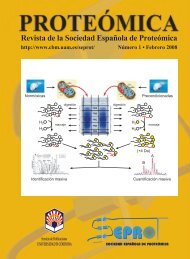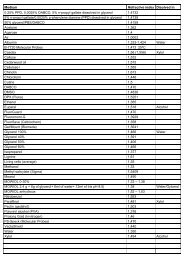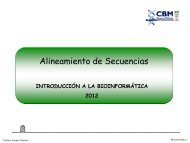Molecular Neurobiology - Universidad Autónoma de Madrid
Molecular Neurobiology - Universidad Autónoma de Madrid
Molecular Neurobiology - Universidad Autónoma de Madrid
You also want an ePaper? Increase the reach of your titles
YUMPU automatically turns print PDFs into web optimized ePapers that Google loves.
<strong>Molecular</strong> <strong>Neurobiology</strong><br />
previous next<br />
Table of contents Section contents Home Exit<br />
D3<br />
Neuronal repair and molecular therapy in neuro<strong>de</strong>generation. Spinocerebellar ataxias<br />
Research summary<br />
Many neurogenetic diseases are characterized by a progressive neuro<strong>de</strong>generative process in which selective<br />
populations of neurons become dysfunctional and eventually die. Mo<strong>de</strong>l diseases in this respect are the<br />
spinocerebellar ataxias, which are characterized by neuro<strong>de</strong>generation affecting the cerebellum, brainstem<br />
and spinal cord. Our group studies neuronal dysfunction and <strong>de</strong>ath processes to find pathways to promote<br />
neuronal survival and repair with the prospects of <strong>de</strong>veloping new therapeutic tools.<br />
Research summary<br />
Staff<br />
Publications<br />
Other activities<br />
We have focused our attention on Friedreich´s ataxia, a hereditary neurological disor<strong>de</strong>r resulting from a<br />
<strong>de</strong>ficiency of frataxin, which is a mitochondrial protein enco<strong>de</strong>d for by the nuclear genome. Our aims are<br />
directed to a <strong>de</strong>eper un<strong>de</strong>rstanding of neuro<strong>de</strong>generation and the <strong>de</strong>velopment of experimental molecular<br />
therapy approaches. Thus we are also very interested in the optimization of the technologies for gene transfer<br />
to cells of the central nervous system. In this context, we use lentiviral and herpesviral vectors for neuronal<br />
gene transfer in or<strong>de</strong>r to validate possible therapeutic targets, perform functional genomic analyses and <strong>de</strong>sign<br />
novel gene therapy approaches.<br />
Thus, we use cell mo<strong>de</strong>ls to study the molecular changes triggered by frataxin gene <strong>de</strong>ficiency within mammalian<br />
neurons. These studies may facilitate the i<strong>de</strong>ntification of novel therapeutic targets not only for Friedreich´s<br />
ataxia but also for other neurological diseases characterized by a prominent mitochondrial dysfunction.<br />
Likewise, we also explore therapeutic approaches based on possible drugs (or biomolecules) able to either<br />
increase frataxin expression or compensate for frataxin <strong>de</strong>ficiency in mature mammalian neurons<br />
We have also used a Friedreich´s ataxia animal mo<strong>de</strong>l to assay a gene therapy strategy based on frataxin<br />
gene transfer using herpesviral vectors. This project aims to establish a proof-of-principle about the suitability<br />
of gene therapy for recessive spinocerebellar ataxias.<br />
CBM 2007-2008


